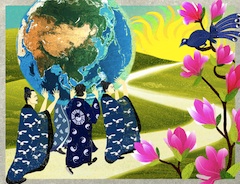| |
|
 |
Great review for Sacred Mountains in Hong Kong’s South China Morning Post
September 10, 2014:
Sacred Mountains: How the Revival of Daoism is Turning China's Ecological Recovery Around
by Allerd Stikker
Bene Factum, 2014
Cities are draped in smog for ever-longer periods and rivers are turning black, red and yellow as waste is dumped in. Meanwhile, algae merrily sprout, writes green business guru Allerd Stikker in his spiritually slanted assessment of China's pollution crisis.
The solution, he writes, is a riddle-rich faith with roots stretching deep into Chinese culture: Daoism (or Taoism), the ancient religious philosophy. "You could argue that the [Taoists] are the pioneers of nature conservation. In an entirely natural way, they are the very first protectors of nature."
Previously responsible for two other ecological tracts, Stikker was converted to the green cause by business trips to Taiwan at the end of the 1970s. Back then, he ran RSV, a Dutch shipbuilding company that produced naval kit. Taiwan introduced him to Taoism and severe pollution.
"At that time, the country was known as the Economic Miracle of the Far East. But I felt it was turning into the Ecological Disaster of the Far East," he writes, mentioning smog that forced people to wear masks. Economic growth and a rising living standard left little space for ecological niceties, it seemed, although eventually the Taiwanese government addressed the mess, persuaded by public protests.
In turn, Stikker hopes Beijing will clean up the mainland, spurred by Taoism. Despite Mao Zedong's stabs at quashing the faith, it is rebounding, especially popular among the younger generation born after the Cultural Revolution. Do not dismiss Taoism as a backward superstition, Stikker says.
"It has proven to be just as solid and unyielding as the rocks of the sacred mountains, a traditional [Taoist] symbol of the link between heaven, earth and humanity since time immemorial," he writes.
 |
 |
 |
Fabulous illustrations by Rosa Vitalie |
His argument is peppered with sharp, tangential observations that reflect his business background. For instance he cannily refers to the Confucian practice of giving clients and superiors desirable rather than realistic answers - a point Westerners doing business on the mainland should remember.
Stikker's business-slanted take on ecology and spirituality is intriguing but the question remains of whether Taoism has the heft to resolve China's environmental crisis. The faith's emphasis on working with rather than against nature seems smart, but at its heart, it is contradictory - as even its founder Lao Tzu admitted. "The truth is that the truth is often a paradox," he wrote in his meditation the Tao Te Ching.
Some may see the scriptures as mumbo jumbo. Worse, given all the faith-based wars unfolding now - not least the Shia-Sunni conflict - religion generally seems suspect.
Yet it is hard to fault Stikker's premise: in the dialogue between ecology and the economy, the former has played second fiddle for too long. China's pea-soup smog, filth-ridden rivers, and cancer villages prove that.
Buy the book
Read more about the writing of the book
DOWNLOAD YOUR FREE CHAPTER FROM THE BOOK
South China Morning Post
|
 |
 |
|
|
|
|
|
 |
China Projects
China's great traditional religions are once again exerting influence. Monasteries are being re-opened and religious customs revived. ARC is working with Chinese Buddhists and Daoists to encourage their involvement in supporting environmental change |
 |
Daoist ecology
A summary of the environmental teachings of Daoism |
 |
July 15, 2014:
Confucius returns to the mainland: South China Morning Post story
The heat was intense. As the speakers took the podium in the gardens of Shenzhen Polytechnic a young woman fainted. Within a few seconds, a second student followed... article by ARC's Victoria Finlay on the return of Confucianism, ARC's latest faith partner. |
 |
 |
|
|

